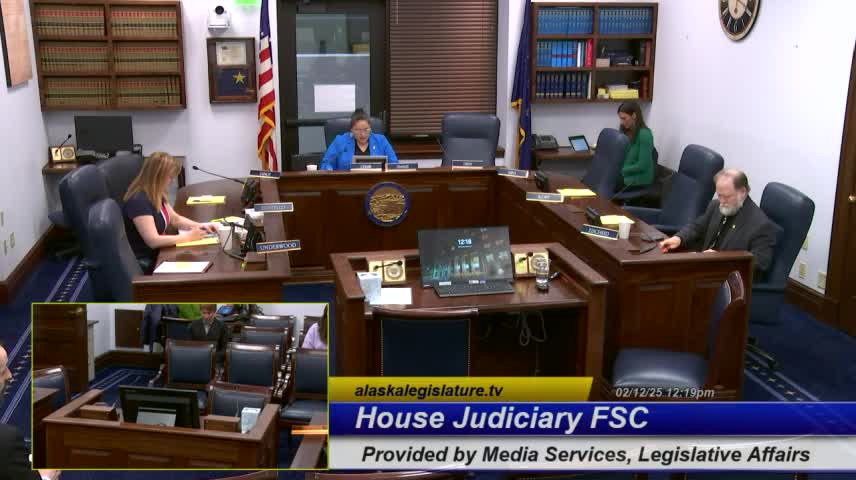Alaska court system asks Legislature for maintenance funding, support for therapeutic courts and court-visitor program
Get AI-powered insights, summaries, and transcripts
Subscribe
Summary
At a Feb. 12 Alaska House Finance Subcommittee on Judiciary hearing, the Alaska Court System presented its FY26 operating request focused on maintenance costs, a true-up for the court-visitor program and funding to sustain therapeutic-court positions and reimbursable staff.
At a Feb. 12 meeting of the Alaska House Finance Subcommittee on Judiciary, the Alaska Court System outlined its FY26 operating budget request, asking the subcommittee to fund facility maintenance and utilities, a statutory court-visitor program true-up, an attorney position for the Early Resolution Project paid through interagency receipts, and funding to cover personnel costs supporting therapeutic courts statewide.
The requests are maintenance-focused and do not seek to expand court programs with additional unrestricted general fund (UGF) authority, the court’s associate counsel said. "This is, just a maintenance budget to keep our operations as they are," Noah Klein, associate counsel for the Alaska Court System, told the committee.
The court highlighted several specific increments in the subcommittee budget book. Increment 1 covers lease renewals and increased building maintenance. Klein said the governor’s executive budget includes $363,500 for that item, while the court has requested $552,003. Klein told the committee that additional elements the court requested but that are not included in the governor’s amount include funds the court identified as CPI increases for some leases and an increase for utility costs; the committee heard figures of roughly $97,000 and $91,000 for those items during discussion, which the court said it would seek in an amendment.
Rhonda McLeod, chief financial officer for the Alaska Court System, described the court’s facility portfolio when members asked which sites are state-owned versus leased. "Twelve of our facilities are owned by the state. We have 14 that are [leased]. And then we have 12 that are owned by a city," McLeod said. Earlier in the presentation Noah Klein referred to the court system’s total of 39 facilities while noting he did not have exact ownership counts at the outset.
Increment 3 requests funding to cover the statutorily mandated court-visitor program after the program transferred to the court system in FY23 from the Office of Public Advocacy. Klein described court visitors as "essentially court appointed individuals" who are contractors assigned by the court to assist with guardianship and conservatorship cases by evaluating whether appointment or continuation of a guardian or conservator is appropriate. The court asked the subcommittee for a "true up" to match expected hours going forward based on the last two fiscal years; Klein said this is intended to fully fund expected future hours, not to pay for past hours worked.
The court also requested an additional attorney position for the Early Resolution Project (increment 4). Klein said this position would be funded by non-UGF interagency receipts and that the federal dollars would be passed through the Child Support Division.
On therapeutic courts, the court requested two related increments. One increment seeks $158,000 in authority to use Mental Health Trust funds to cover two longstanding positions that review competency dockets and screen candidates for therapeutic-court participation. A second increment requests the remaining $92,000 in general-fund authority to fully fund those two positions. Klein said those two items should be viewed together. The court also requested a $170,000 increment to cover increased costs for reimbursable services agreements (RSAs) that pay staff employed by other executive-branch agencies but assigned to therapeutic courts; those agencies recently received raises, and the court must reimburse the higher employer costs.
Committee members asked about the geographic availability and cost of therapeutic courts. Klein said Alaska currently has 13 therapeutic courts located in six communities: Anchorage, Palmer, Sitka, Kenai, Fairbanks and Juneau. On the cost to add therapeutic courts, he said per-court costs vary widely depending on capacity and services: "the spectrum of the costs of our therapeutic courts range from less than a hundred thousand dollars to close to $2,000,000," he said, and noted that administrative costs are shared across courts. Rhonda McLeod added that local pay differentials and travel expenses (for example, to remote villages) also affect cost, citing a roughly 50 percent geographic pay differential for Bethel-area salaries as an example.
Klein closed by saying the court hopes the committee will fund its operating requests and signaled the court would seek amendments in the legislative process to secure amounts not included in the governor’s executive budget. "We would just hope that the committee would fund our operating budget requests," he said. No formal votes or motions were taken during the hearing.
The subcommittee scheduled its next meeting for Wednesday at noon in Room 120.
